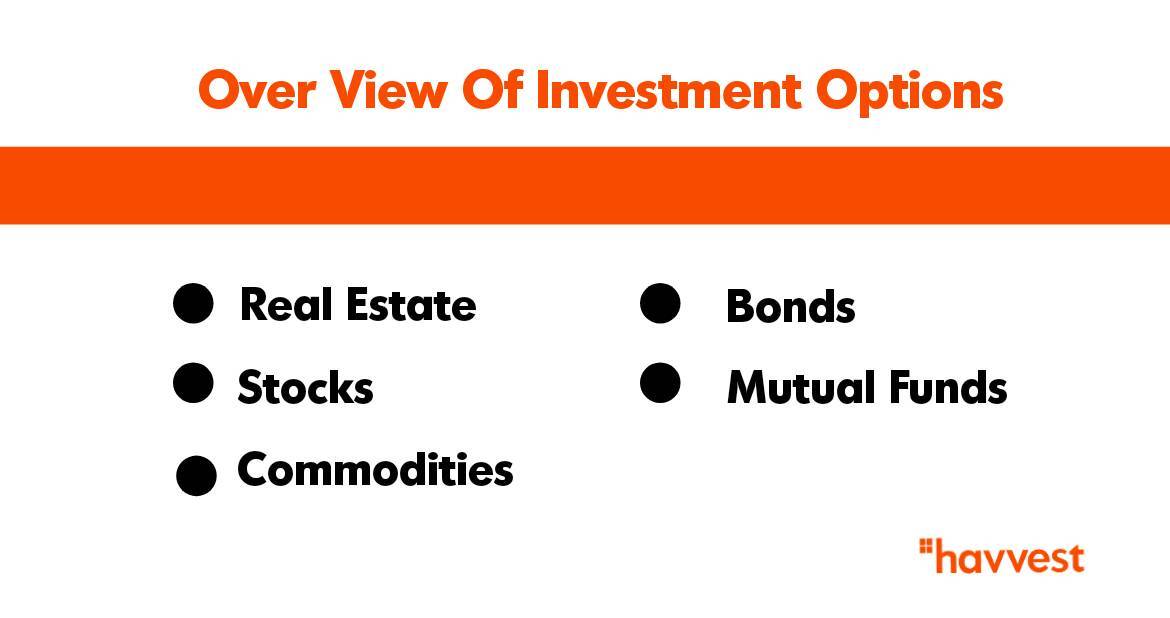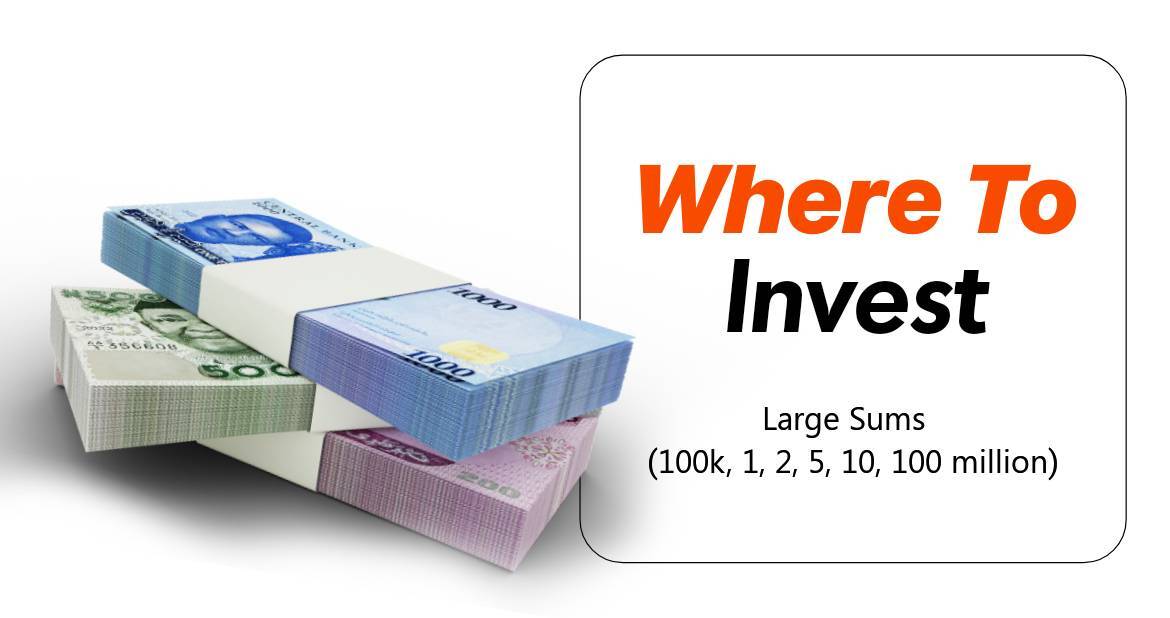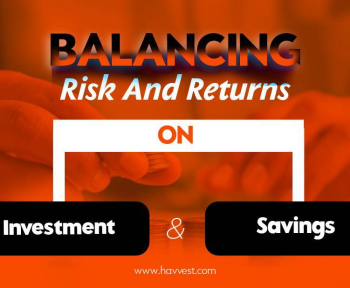If you’ve devotedly followed through previous blogs, it’s safe to assume that you are saving, investing, and building funds. Perhaps these funds have become significant or you have encountered large sums and are unsure of where to invest them. That my dears is synergy! I bet you can feel the connection already.
No doubt, large-scale investing calls for thorough preparation, research, and a readiness to take some amount of risk. Most importantly, consulting with a financial adviser or investing expert may assist you in navigating these challenges and building a broad portfolio that satisfies your requirements as well as your goals.
This is exactly what we will be covering in this blog post. We will be narrowing down significant sum investment opportunities in Nigeria and how to approach them.
Overview of Investment Options

Naturally, the ideal thought on investing in Nigeria is buying shares and waiting for it to grow and then making profits. Despite this opinion held by many, there are still many great methods to profit from your investments.
When contemplating investing in Nigeria, the first thing you should do is explore the many alternatives accessible to you. Given the wide range of investment opportunities, it’s important to know what each type of investment achieves so that you can choose the one that’s best for you.
Among the most common sorts of investments are:
1. Real Estate
This type of investment can involve buying physical property or investing in real estate investment trusts (REITs), which are securities that own and manage real estate properties.
 Real estate investments come with lots of potential, these benefits include:
A great source of passive income: due to its consistent revenue flow, real estate is a fantastic source of passive income. Investors don’t have to worry about being paid for renting out their homes or constantly selling them. Instead, they may let the market handle everything and let the market determine how much they ought to receive for their home.
When it comes to investing with companies like Havvest, you basically sit back and watch your money grow exponentially.
Additionally, this investment type pays off over time. It provides you with significant growth potential over time, especially if you choose the right type of property and location.
2. Stock
Investing in stocks involves buying shares of publicly-traded companies. Investors usually make money by selling shares at a higher price than they bought them for or by receiving dividends from the company’s profits.
A good benefit of stock is liquidity – this refers to how easily you can sell your shares at any time during the year without affecting their value (or losing money). Relatively, you can get a steady return of about 8% on a good stock annually.
3. Bond
A bond is a fixed-income investment in which an investor loans money to a company or government entity and earns interest on the loan. Bonds are generally considered less risky than stocks but also offer lower returns.
Benefits of investing in bonds include: bonds make for comparatively secure investments. Although, it could be challenging for you to sell a bond quickly enough to recover your investment before it loses value.
It carries less risk because they fluctuate less over time and don’t expose investors to the same companies as stock ownership does (although some bonds do).
4. Mutual Funds
A mutual fund is an investment vehicle that pools money from multiple investors to buy a diverse portfolio of stocks, bonds, or other assets. Mutual funds are managed by investment professionals and offer investors the ability to diversify their portfolios with relatively low investment amounts.
A good benefit of mutual funds is that it provides investors with a diversified portfolio of assets such as stocks, bonds, and other securities.Â
Secondly, mutual funds are liquid, allowing investors to quickly purchase and sell shares on the open market. Investors now have simple access to their money whenever they need it.
5. Commodities
Commodities investments can include gold, oil, and agricultural goods. This may diversify a portfolio and shield it from inflation. However, the price of commodities can fluctuate and be impacted by a variety of variables, including supply and demand, geopolitical events, and weather.
Benefits of commodity investment include:
Protection against inflation and commodities, especially precious metals like gold. This has been used as a hedge against inflation. It is due to the fact that as currency values decrease, the value of commodities tends to increase.
Additionally, investing in commodities has the potential for substantial profits, especially during times of high demand or market volatility.
Evaluating Investment Opportunities
Evaluation is the process of studying anything to decide on its importance, value, or efficacy. When seeking to invest large sums, the investment type should be evaluated properly to know if it is the right fit for your budget as well as plan.
As a general rule, higher-risk investments tend to offer greater potential rewards, while low-risk investments offer more modest returns. Hence, it’s important to have a clear understanding of your investment goals. Then, consider the level of risk associated with each investment opportunity.Â
Subsequently, all investment types come with their defects, therefore carefully consider the potential drawbacks of each opportunity, including any fees, taxes, or other costs associated with investing and make your decision.
Always remember, in investing:
“The best way to measure your investing success is not by whether you’re beating the market but by whether you’ve put in place a financial plan and a behavioural discipline that are likely to get you where you want to go.â€
– Benjamin Graham
What Investment Type is Most Suitable in Nigeria
Real estate has so far proved in many ways that it is the most suitable type of investment in Nigeria because not only is it a safe investment, but it is also the most competent investment type.
With the growing population and urbanisation, suitable and predictable returns, capital appreciation, diversification and government support it is a viable investment option for many.
Havvest plays a significant role in the real estate sector by providing a platform that offers recommendations on investment opportunities based on extensive research. It suggests the most efficient methods to invest funds and provides guidance on profitable types of investments for the future. So, what are you waiting for? Become a Havvestor today, save, invest and consult us on everything real estate.

If you’ve devotedly followed through previous blogs, it’s safe to assume that you are saving, investing, and building funds. Perhaps these funds have become significant or you have encountered large sums and are unsure of where to invest them. That my dears is synergy! I bet you can feel the connection already.
No doubt, large-scale investing calls for thorough preparation, research, and a readiness to take some amount of risk. Most importantly, consulting with a financial adviser or investing expert may assist you in navigating these challenges and building a broad portfolio that satisfies your requirements as well as your goals.
This is exactly what we will be covering in this blog post. We will be narrowing down significant sum investment opportunities in Nigeria and how to approach them.
Overview of Investment Options

Naturally, the ideal thought on investing in Nigeria is buying shares and waiting for it to grow and then making profits. Despite this opinion held by many, there are still many great methods to profit from your investments.
When contemplating investing in Nigeria, the first thing you should do is explore the many alternatives accessible to you. Given the wide range of investment opportunities, it’s important to know what each type of investment achieves so that you can choose the one that’s best for you.
Among the most common sorts of investments are:
1. Real Estate
This type of investment can involve buying physical property or investing in real estate investment trusts (REITs), which are securities that own and manage real estate properties.
 Real estate investments come with lots of potential, these benefits include:
A great source of passive income: due to its consistent revenue flow, real estate is a fantastic source of passive income. Investors don’t have to worry about being paid for renting out their homes or constantly selling them. Instead, they may let the market handle everything and let the market determine how much they ought to receive for their home.
When it comes to investing with companies like Havvest, you basically sit back and watch your money grow exponentially.
Additionally, this investment type pays off over time. It provides you with significant growth potential over time, especially if you choose the right type of property and location.
2. Stock
Investing in stocks involves buying shares of publicly-traded companies. Investors usually make money by selling shares at a higher price than they bought them for or by receiving dividends from the company’s profits.
A good benefit of stock is liquidity – this refers to how easily you can sell your shares at any time during the year without affecting their value (or losing money). Relatively, you can get a steady return of about 8% on a good stock annually.
3. Bond
A bond is a fixed-income investment in which an investor loans money to a company or government entity and earns interest on the loan. Bonds are generally considered less risky than stocks but also offer lower returns.
Benefits of investing in bonds include: bonds make for comparatively secure investments. Although, it could be challenging for you to sell a bond quickly enough to recover your investment before it loses value.
It carries less risk because they fluctuate less over time and don’t expose investors to the same companies as stock ownership does (although some bonds do).
4. Mutual Funds
A mutual fund is an investment vehicle that pools money from multiple investors to buy a diverse portfolio of stocks, bonds, or other assets. Mutual funds are managed by investment professionals and offer investors the ability to diversify their portfolios with relatively low investment amounts.
A good benefit of mutual funds is that it provides investors with a diversified portfolio of assets such as stocks, bonds, and other securities.Â
Secondly, mutual funds are liquid, allowing investors to quickly purchase and sell shares on the open market. Investors now have simple access to their money whenever they need it.
5. Commodities
Commodities investments can include gold, oil, and agricultural goods. This may diversify a portfolio and shield it from inflation. However, the price of commodities can fluctuate and be impacted by a variety of variables, including supply and demand, geopolitical events, and weather.
Benefits of commodity investment include:
Protection against inflation and commodities, especially precious metals like gold. This has been used as a hedge against inflation. It is due to the fact that as currency values decrease, the value of commodities tends to increase.
Additionally, investing in commodities has the potential for substantial profits, especially during times of high demand or market volatility.
Evaluating Investment Opportunities
Evaluation is the process of studying anything to decide on its importance, value, or efficacy. When seeking to invest large sums, the investment type should be evaluated properly to know if it is the right fit for your budget as well as plan.
As a general rule, higher-risk investments tend to offer greater potential rewards, while low-risk investments offer more modest returns. Hence, it’s important to have a clear understanding of your investment goals. Then, consider the level of risk associated with each investment opportunity.Â
Subsequently, all investment types come with their defects, therefore carefully consider the potential drawbacks of each opportunity, including any fees, taxes, or other costs associated with investing and make your decision.
Always remember, in investing:
“The best way to measure your investing success is not by whether you’re beating the market but by whether you’ve put in place a financial plan and a behavioural discipline that are likely to get you where you want to go.â€
– Benjamin Graham
What Investment Type is Most Suitable in Nigeria
Real estate has so far proved in many ways that it is the most suitable type of investment in Nigeria because not only is it a safe investment, but it is also the most competent investment type.
With the growing population and urbanisation, suitable and predictable returns, capital appreciation, diversification and government support it is a viable investment option for many.
Havvest plays a significant role in the real estate sector by providing a platform that offers recommendations on investment opportunities based on extensive research. It suggests the most efficient methods to invest funds and provides guidance on profitable types of investments for the future. So, what are you waiting for? Become a Havvestor today, save, invest and consult us on everything real estate.



